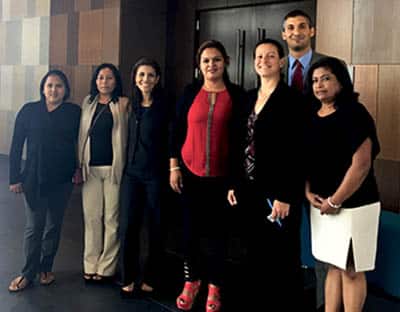
by Nancy Kinnally
To most Floridians the town of Felda in Hendry County is little more than an overlooked dot on a state map, but to five women who worked in the Moreno Farms packing house there it became their own little corner of Hell.
Maria del Carmen Aguilar, one of five plaintiffs recently awarded a $17.4 million verdict against Moreno Farms, lived in terror knowing that the men who had sexually harassed and in some cases raped female workers at the plant were still free and might run into her.
“Here I am more in peace,” the 27-year-old said from her native Mexico, to where she had retreated before the case went to trial, and from where she returned to testify in federal court in a U.S. Equal Employment Opportunity Commission sexual harassment and retaliation case against her former employer.
Even before she made the journey from her rural village to the federal courthouse in Miami, Aguilar knew she would never see a penny of any verdict. Moreno Farms had long since been dissolved, and its owners had vanished. But coming back to Florida was her only chance to have her day in court.
“Although at the time we were scared, now we can do something so that they can’t continue doing the same thing to other women,” Aguilar said. “We are not going to stay quiet. It was very important to me to be in front of a judge and for people to see that we were present.”
Aguilar and her former coworkers were represented by Victoria Mesa-Estrada, at first as a legal aid attorney with the Florida Legal Services Migrant Farmworker Justice Project, which is funded by The Florida Bar Foundation, and later as a pro bono attorney with Mesa & Coe Law in Lake Worth, Fla.
Mesa-Estrada and her fellow legal aid attorney Vanessa Coe were laid off just months before the trial because of cuts in the Foundation’s funding for the Migrant Farmworker Justice Project that came as a result of the drying up of revenue from Florida’s Interest on Trust Accounts Program.
At that point Mesa-Estrada had been working on the case for two years, during which she had gained the women’s trust.
“Either I stayed on the case, or the case was going to completely fall apart,” she said. “The charging parties were not going to appear if I was not there.”
Because local law enforcement had declined to pursue the female workers’ claims of rape and sexual harassment, Mesa-Estrada had filed charges on their behalf with the U.S. Equal Employment Opportunity Commission, which in turn completed an investigation and filed the lawsuit. The agency had recently made vulnerable populations such as migrant workers a priority.
Robert Weisberg, regional attorney for the EEOC’s Miami District Office, said losing the involvement of attorneys like Mesa-Estrada is a blow to his agency’s efforts.
“The cutbacks to programs such as the Migrant Farmworker Justice Project at Florida Legal Services in my mind can be really devastating to the access that some of the most vulnerable workers in the state of Florida have to the legal system,” Weisberg said. “They have developed relationships with the members of the community so that these workers will have a level of trust in interacting with them.”
He points out that the EEOC’s only offices in Florida are in downtown Miami and downtown Tampa, far from the rural areas where migrant workers live and work, and his agency’s ability to do outreach work is limited by its own funding challenges. Legal services offices, on the other hand, have been actively engaged in migrant farmworker communities for decades.
“If legal services attorneys don’t exist in those areas, the likelihood that we’re going to be able to effectively seek justice for these people is really going to be diminished,” Weisberg said. “They are going to be less likely to come forward, at the outset and throughout the case.”
Greg Schell, a Harvard Law graduate and managing attorney of the Migrant Farmworker Justice Project, has seen his program’s funding – which comes solely from The Florida Bar Foundation – cut from $861,052 in 2010-11 to $274,558 in 2014-15, making it just 31 percent of what it was just four years ago. His staff has gone from six attorneys and two outreach paralegals to two attorneys and no support staff.
Schell, 62, is afraid the other young attorney who works for him will soon leave in search of more stable work.
“That’s the nature of this slow water torture we’re having,” said Schell, who is among the nation’s leading farmworker advocates.
Schell does training for new attorneys all over the country and annotates case decisions so that his fellow advocates have a “Bible” of migrant farmworker-related case law. His office primarily works on wage and hour cases, but also turns up cases involving substandard housing, pesticide exposure and other noncompliance with health and safety standards, and sexual harassment.
“There is a reason that every major documentary done on farmworkers in the United States has always focused on Florida, from Harvest of Shame on, because Florida is this huge agricultural state that has historically not done well by its farmworker population,” he said.
While the trend now is toward hiring legal guestworkers from overseas rather than undocumented workers, Schell said these workers are still subject to abuse and no more likely to report it, since doing so would jeopardize their chances of getting an employer-sponsored visa for next year’s harvest.
“We’re going to have to be very smart in what we do, and be very careful in what we undertake, and be very efficient,” Schell said.
The Moreno Farms case is an example of one that serves a larger purpose, even though there were only five plaintiffs. That’s why the MFJP continued to cover expenses on the case with Florida Bar Foundation funds even after Mesa-Estrada was no longer on staff.
“Impact work is not necessarily having a class action. It’s sometimes sending a signal to a defendant community that certain behaviors are unacceptable and will result in some serious sanctions,” Schell said.
The multi-million-dollar, albeit uncollectable verdict, was covered in statewide, national and even international media, including daily newspapers, trade press such as Business Insurance, and Mexican television, which is why pursing the damages trial was important, even though the defendants were not going to appear.
“We firmly believed that this was a message that needed to get back to the community, that these women knew that they had rights, and that there was an agency willing to step up and vindicate their rights somehow,” Mesa-Estrada said. “But we also needed to send a message to the agricultural industry, so that they realized that these practices are not acceptable and that they needed to start looking into their procedures and oversee their employees as they should.”
The Migrant Farmworker Justice Project is the only statewide program of its kind in Florida. Florida Rural Legal Services, which has a migrant unit based in Immokalee, Fla., receives funding not only from The Florida Bar Foundation but also from the federally-funded Legal Services Corporation (LSC), which is prohibited by Congress from serving undocumented workers like the women in the Moreno Farms case.
“There are probably 100,000 workers in Florida who are not eligible for LSC representation, so we’re their only lawyers,” Schell said. “And probably of that 100,000 a high percentage have employment-related problems. And I don’t think I can be a lawyer for 50,000 people.”
Schell also worries what will happen when he is no longer around.
“At some point we’re going to have to say, where is the next generation? And starting from scratch is a terrible idea. One of the great challenges of legal aid work generally is institutional memory and passing on knowledge. And I had two young attorneys who’ve sort of come into their own now. They were doing really spectacular work, and they were passionate about it. You can’t buy the passion. Their talents are going to be lost.”

Mesa-Estrada, a 2014-15 fellow in The Florida Bar’s William Reece Smith Jr. Leadership Academy, is struggling to overcome what she calls “the heartbreak” of being laid off from the work she loved. But she and Coe are still committed to serving low-income families. They are trying to help their clients with payment plans as they handle divorces, child support, domestic violence, immigration and employment law cases. But the transition has been a struggle.
“It’s been very difficult because you don’t just become a businesswoman in a few months, and I’ve been blessed that for the last 20 years since I started college I have always worked in the nonprofit sector,” Mesa-Estrada said. “I passed on at least three offers during my time at Florida Legal Services for more money, and it was a decision that even though I had a family and I should have taken, I told my husband I am not doing it. This is what I love doing. I have found my place in the world.”
Still burdened with her student loans as she works to build her practice and continues to handle a few other legal aid cases she couldn’t bring herself to abandon, Mesa-Estrada nonetheless became a Florida Bar Foundation Fellow just a couple of months after her legal aid paycheck stopped by pledging $1,000 to the Foundation, payable over 10 years.
“Even after being laid off, I am still committed to the principles of the Foundation, and I want to continue supporting that, even if it’s only a few dollars a year,” she said.
And when she speaks to law students, as she did recently at her alma mater, St. Thomas University School of Law, she tells them that public interest law is worthy of consideration as a career, even though the opportunities are extremely limited and highly competitive.
“I tell them a legal aid career is the most rewarding career in the world,” she said. “But it can also break your heart.”




